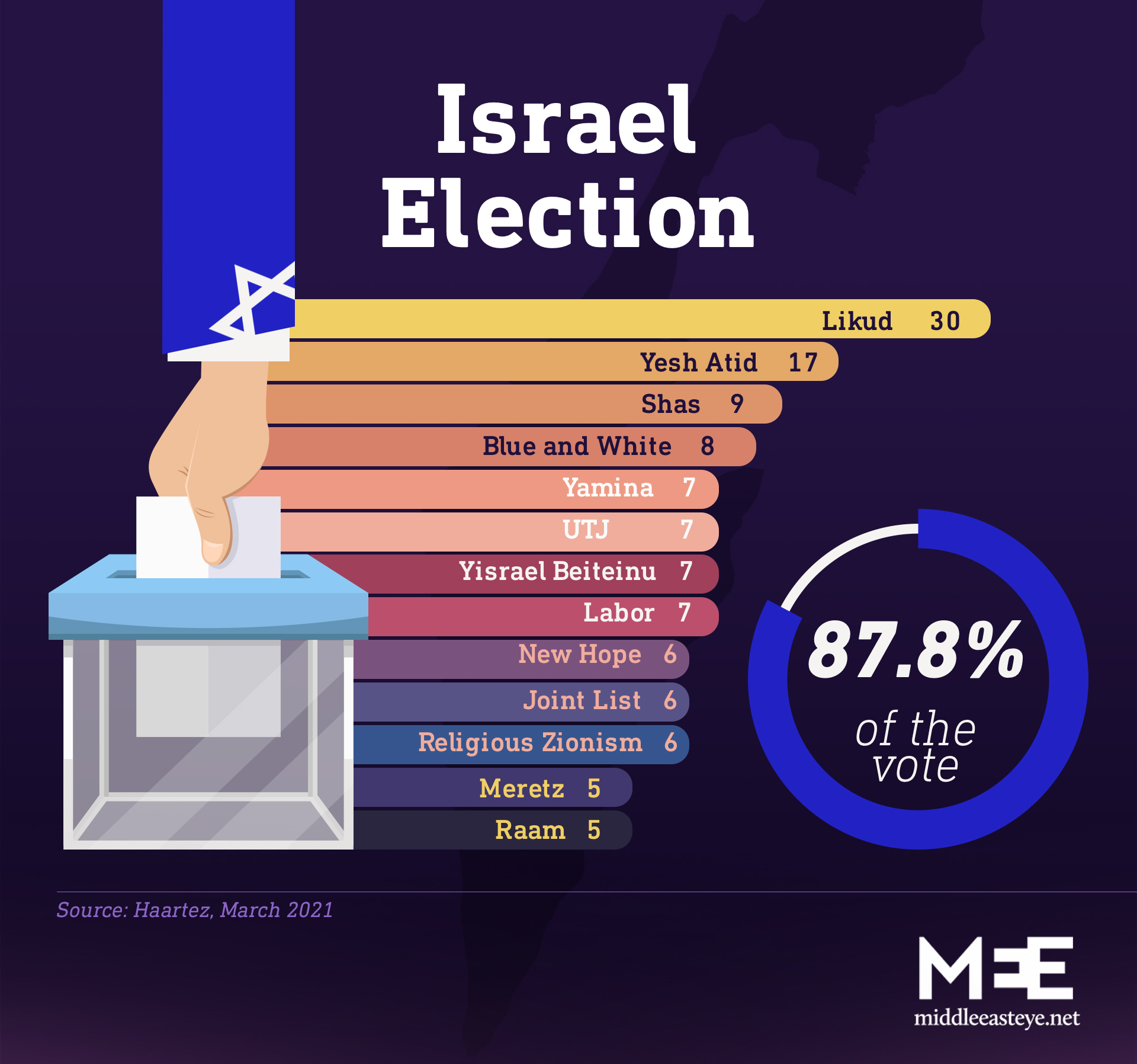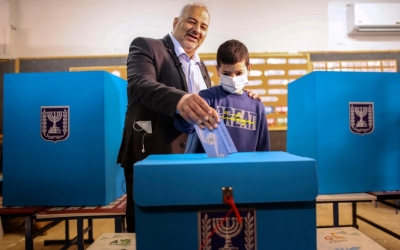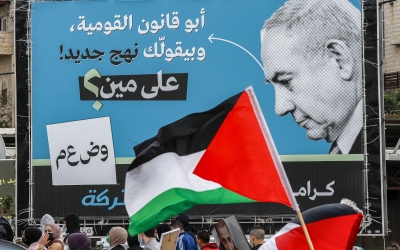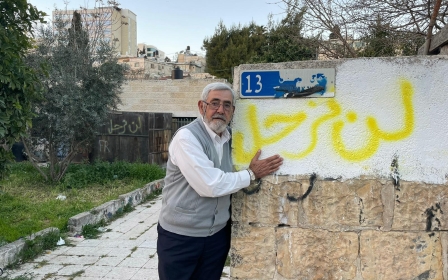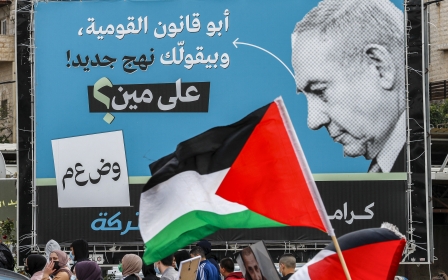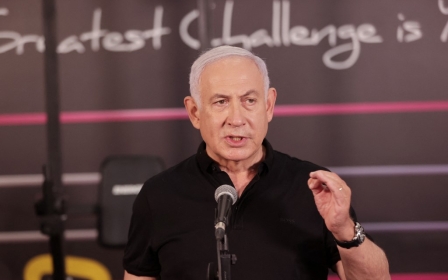Israel elections: Latest results show Netanyahu without clear path to power

The Religious Zionist Party, an alliance of parties which includes Kahanists, the Noam Party and the national-religious National Union-Tkuma, has exceeded expectations in Israel's fourth election in two years.
With nearly 90 percent of votes counted the Religious Zionist Party had six seats, while Prime Minister Benjamin Netanyahu's Likud party had taken 30 seats in the 120-member Knesset.
As counting continues, Netanyahu still does not have the 61-seat majority needed to form a coalition.
Central Elections Committee data showed a potential coalition of left, right and centrist factions was also just short of a majority.
New MEE newsletter: Jerusalem Dispatch
Sign up to get the latest insights and analysis on Israel-Palestine, alongside Turkey Unpacked and other MEE newsletters
Neither the United Arab List party, headed by Mansour Abbas with five seats, nor Naftali Bennett's Yamina, with seven seats, have declared their support for either bloc.
The Joint List, the main bloc of Palestinian parties, which Abbas broke away from to stand as an independent, took six seats, down nine seats from the March 2020 election, according to the latest count.
Netanyahu's potential bloc so far has 59 seats, two short of a majority, if Bennett joins it and if the United Arab List does not.
Bennett shares Netanyahu's hard-line nationalist ideology but has remained noncommittal about his coalition intentions.
"I will do only what is good for the state of Israel," Bennett was quoted as saying by a spokesman immediately after polling stations closed.
In an interview on Wednesday morning, Abbas said that he is not beholden to either bloc, and will not rule out joining any coalition, but will rule out any party that rules out the list, Haaretz reported.
About 450,000 ballots in double-sealed envelopes have yet to be counted.
Should Netanyahu succeed in forming a coalition, Israel will have the most right-wing government in its history and is likely to contain followers of far-right Rabbi Meir Kahane.
According to Haaretz, the Religious Zionist's shock gains mean Itamar Ben-Gvir, the party's number three, could be up for a ministerial spot in a potential government.
A lawyer and leader of the far-right Otzma Yehudit Party, Ben-Gvir is a Kahanist who has voiced admiration for Baruch Goldstein, the mass-murderer of 29 Palestinian worshippers in the occupied West Bank in 1994.
Ben-Gvir is also known for defending individuals suspected of carrying out hate crimes and has repeatedly called for the expulsion of Palestinian citizens of Israel who are not loyal to Israel.
According to Haaretz, in addition to Ben-Gvir, Avi Maoz, who is number six on the Religious Zionist list, also appears to be headed for the Knesset.
Maoz is the leader of the Noam Party which has called for the expulsion of "foreign" influences – which it has blamed for the growing acceptance of LGBTQ lifestyles.
The Palestinian vote
Earlier on Tuesday, the United Arab List had warned that the party may not cross the electoral threshold required to make it into the Knesset, but this proved not to be the case.
At around 7pm, local time, director Ibrahim Hijazi said Palestinian citizens of Israel had turned out at only around 35 percent, Haaretz reported.
Enas Masri, a 40-year-old education worker who lives in the Palestinian village of Jaljulia, told Middle East Eye that he had not voted in the past three elections, and "won't vote this time".
"It's a game and I don't think the Israeli Knesset is my place," Masri said.
"We are living in an illusion, especially regarding the idea of citizenship. We haven't achieved anything so far inside the Israeli parliament and we couldn't change our reality. I believe we must build our own autonomy as Palestinians inside Israel and we have to act on the ground and not in the parliament."
Meanwhile, Maha Igbariyya, a Palestinian activist in the northern Israel town of Umm al-Fahem, said she was urging people in her community to vote for the Joint List, insisting its MPs have done important work in highlighting the issue of organised crime that blights its towns and villages.
"For two years, the Joint List has been highlighting this issue in the parliament, and without the Arab MPs, no one would hear about it. The Arab MPs did a lot for '48 Palestinians and they deserve our trust and support," she told MEE.
"Along with the struggle against crime and house demolition, the Joint List is the only party that still speaks about the occupation in the Israeli parliament. This topic is dead in the other parties and no one is mentioning that. I think this is the main problem that should be solved."
Though an estimated five million Palestinians live under Israeli military occupation or siege in the West Bank and the Gaza Strip, they are unable to vote in an election that will have far-reaching consequences for their lives.
The Israeli military closes down the West Bank for every election as its citizens in illegal settlements freely vote.
Bibi's corruption charges
General voter turnout in Israel also showed a decline on Tuesday, compared with the previous three elections.
Weary after a series of failed attempts for any party to form a coalition, many have cast this election as a referendum on Netanyahu who, having been in charge for 15 years, is Israel's longest-serving prime minister.
'Netanyahu wants to get rid of his corruption case and the right-wing wants to cut the wings of the High Court'
- Meron Rapoport, political analyst
Veteran Israeli political analyst, Meron Rapoport, told MEE that this latest election is very much a battle over the justice ministry.
Netanyahu personally has much at stake in the judicial system, as he is fighting corruption charges which could jeopardise his freedom as well as his political career.
Meanwhile, Netanyahu's far-right and religious allies have their own motives for getting hold of the justice ministry, which Blue and White has controlled in the outgoing government.
"The real battle will be over the justice ministry. This is the most important office after the prime minister. Netanyahu wants to get rid of his corruption case and the right-wing wants to cut the wings of the High Court so they can do whatever they want regarding West Bank settlements, women and the LGBT community," Rapoport said.
"They want to keep the lawmaking in their hands."
Before Tuesday's vote, opposition leader Lapid warned that Netanyahu would seek to form a right-wing "racist and homophobic" government if he won.
"This is the moment of truth," he said. "There are only two options: a large Yesh Atid or a government of darkness, racism and homophobia."
Middle East Eye delivers independent and unrivalled coverage and analysis of the Middle East, North Africa and beyond. To learn more about republishing this content and the associated fees, please fill out this form. More about MEE can be found here.


